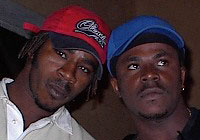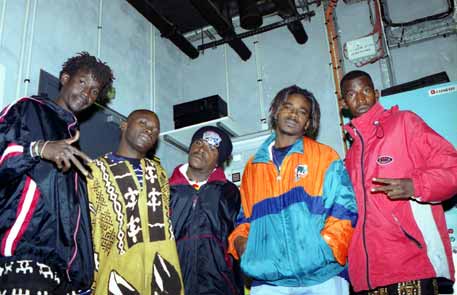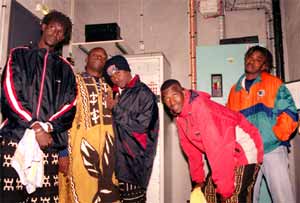|  Nous
sommes à Bamako-coura, le centre ville de Bamako. Le quartier
où se trouvent les endroits chauds de la capitale. Là
où tout commence : phénomènes de mode, délinquance,
rébellion, etc. Nous
sommes à Bamako-coura, le centre ville de Bamako. Le quartier
où se trouvent les endroits chauds de la capitale. Là
où tout commence : phénomènes de mode, délinquance,
rébellion, etc.
1990, de
jeunes amis du quartier se regroupent très souvent au "grin"
après la classe, autour du thé. Ils causent de beaucoup
de choses, danse, filles, musique et école.
A la fin
des vacances scolaires de 90, Ahmed Tidiane Touré
qui était chez sa mère en Grande Bretagne, revient avec
sous le bras des cassettes encore méconnues de ses amis. Entre
temps, il a appris des pas de danse. Les filles du quartiers sont émerveillées
lors des soirées dansantes et se battent toutes pour être
soit à lui ou à un de ses proches.
Chaque jeune du quartier veut maintenant apprendre à danser et
pour ce il faut être dans le grin des jeunes branchés.
Le grin a maintenant dix fois plus d' éléments et il faut
lui donner un nom. C'est comme cela qu'est né le mot Zotto
qui signifie Union.
 Les
jeunes des autres quartiers ont commencé a fréquenter
Zotto et chacun d'eux veux se renseigner
sur les dernières modes de coiffure de danse et de sape. L'idée
leur vint en ce moment d'ouvrir un salon de coiffure qui deviendra plus
tard le quartier général de tous les jeunes branchés
de la capitale. Les
jeunes des autres quartiers ont commencé a fréquenter
Zotto et chacun d'eux veux se renseigner
sur les dernières modes de coiffure de danse et de sape. L'idée
leur vint en ce moment d'ouvrir un salon de coiffure qui deviendra plus
tard le quartier général de tous les jeunes branchés
de la capitale.
Vers la fin Décembre 90, commencent les premières grèves
estudiantines contre le régime du général Moussa
Traoré.
Le salon de coiffure animé essentiellement par les élèves
et étudiants est ciblé par les militaires (en Mars) comme
l'un des repaire du mouvement estudiantin et a chaque accrochage, on
s'attaque au salon. Le matériel de travail fut détruit
à plusieurs reprises, et de nombreux élèves arrêtés
à l'intérieur et aux alentours.
Zotto,
devenait de plus en plus populaire parmi les jeunes.
Les jeunes commencent alors à créer leurs propres rythmes
dans les studios de Bamako et animent les soirées organisées
par ci par là.
Ayant été
au cœur de la révolution de Mars 91, ils sont invités
a toutes les manifestations pendant la transition organisées
par l'association des étudiants du Mali, l'ORTM, le CTSP du général
Amadou Toumani Touré etc.
 Les
Zotto ont maintenant une notoriété
nationale et cette notoriété s'est confirmé lors
de la première investiture du président Alpha Oumar Konaré,
le 08 Juin 1992, au Palais de la Culture de Bamako. Les Zotto
boyz y ont donné une prestation mémorable. Les
Zotto ont maintenant une notoriété
nationale et cette notoriété s'est confirmé lors
de la première investiture du président Alpha Oumar Konaré,
le 08 Juin 1992, au Palais de la Culture de Bamako. Les Zotto
boyz y ont donné une prestation mémorable.
En 1997,
le groupe décide d'aller à Dakar pour enregistrer leur
premier album. En 1998, le groupe revient à Bamako avec sous
le bras un album de six titres.
Même avec leur notoriété, les temps sont durs pour
le rap au Mali. Beaucoup pensent que le rap c'est un phénomène
de mode, une folie passagère …
Le débat sur le rap était à la une de l'actualité
musicale et le directeur de la célèbre maison de production
Kodiavision avait juré sur les antennes de la télévision
lors d'un débat, qu'il ferait danser le rap malien non seulement
aux Maliens mais aussi en occident et que bientôt Bamako pourrait
être la capitale africaine du rap, s'il s'en occupait.
La rencontre des Zotto avec
Michel Tchimbé, un antillais DJ professionnel constitue
un tournant sans précédant dans la carrière des
Zotto. Avec lui, ils ont travaillé
des mois durant sur dubs (instrumentaux) jamaïcains pour ensuite
montrer ce fruit au jeune producteur Mohamed Sanous Diakité de
Kodavision.
Après analyses, Sanous décida de prendre le groupe dans
son écurie. Il fallait entrer à nouveau dans le studio
et faire d'autres titres pour sortir l'album "Nafiguiya".
A la phase de promotion, le titre "Allah Akbar" fut considéré
par certaines autorités comme troublant l'ordre publIc. Le leader
du groupe Ahmed Tidlane Touré dit
Mc Zotto fut arrêté et il
fallut au producteur Mohammed Sanous Diakité la constitution
de l'association des droits de l'homme du Mali et un bataillon d'avocats
émérites pour obtenir sa libération après
une semaine de détention.
 A la sortie de l' album, quel surprise! ! ! Deux cent albums (200) vendus
en trois jours dans la sous région du jamais vu.
A la sortie de l' album, quel surprise! ! ! Deux cent albums (200) vendus
en trois jours dans la sous région du jamais vu.
Depuis les Zotto sont de plus en plus sollicités.
Ils sont attendus dans tous les concerts.
Même les plus grandes griottes
du Mali (qui sont généralement contre le rap) demandent
des featuring avec les Zotto.
Voilà bientôt deux ans que l'album est sorti et il est
toujours aux hits parade des émissions musicales nationales et
internationales.
Les Zotto
parlent de la pauvreté, de la polygamie, du chômage, de
la guerre, de l'excision, du sida, de raclsme, des femmes, de la drogue
et d'union entre les peuples du monde.
Ils chantent en Bambara, en français, anglais, peulh et sonrai
Ils sont tous chorégraphes et chanteurs.
Leur rêve
est de changer le monde c'est pourquoi partout où ils passent,
ils chantent la paix, l'amour, l',union entre les individus et les peuples.
Crédit photos/
Hervé Leteneur - UNDOO/REDOO undoo@wanadoo.fr
|
|  We
are in Bamako-coura, the town centre of Bamako, the quarter where the
hot places of the capital are. The place where every thing starts: fashion
phenomena, delinquency, rebellion, etc. We
are in Bamako-coura, the town centre of Bamako, the quarter where the
hot places of the capital are. The place where every thing starts: fashion
phenomena, delinquency, rebellion, etc.
1990, young friends of the district very often gather in the "grin"
after school, around the tea. They chat about many things, dance, girls,
music and school.
At the end of the holidays of 1990, Ahmed Tidiane Touré
who was by his mother in the United Kingdom returns in Mali with tapes
that his friends ignored. Meanwhile, he learned steps of dance. The
girls of the districts are filled with wonder during parties and fight
to be with him or with one of his close relations.
Each young person of the district now wants to learn how to dance and
for that, it is necessary to be in the “grin (group)” of
the trendy young people.
Now the grin has ten times more elements and it is necessary to give
it a name: “Zotto” which means Union.
 The
young people of the other districts started to frequent Zotto and each
one wants to have information about the latest fashions of hairstyle
of dance and dressing. They then have the idea to open a hairdressing
room which will later become the headquarters of all the trendy young
people of the capital. The
young people of the other districts started to frequent Zotto and each
one wants to have information about the latest fashions of hairstyle
of dance and dressing. They then have the idea to open a hairdressing
room which will later become the headquarters of all the trendy young
people of the capital.
At the end of December 90, the first student's strikes against the regime
of the General Moussa Traoré start.
The hairdressing room animated primarily by pupils and students is targeted
by the soldiers (in Mars) like one of the den of the student's movement
and each time there is a hooking, they tackle the hairdressing room.
The material was destroyed on several occasions, and many pupils arrested
inside and in the neighbourhoods.
Zotto became more and more popular among the young people.
The young people then start to create their own beats in the studios
of Bamako and to animate the parties organized everywhere in the capital.
Having been in the heart of the revolution of Mars 91, they are invited
at all the manifestations organized by students’ association of
Mali during the transition, the ORTM, the CTSP of the General Amadou
Toumani Touré etc.
 The
band Zotto now has a national notoriety which was confirmed during the
first nomination of the president Alpha Oumar Konaré, June 08,
1992, at the Palace of the Culture of Bamako. Zotto boyz gave a memorable
performance. The
band Zotto now has a national notoriety which was confirmed during the
first nomination of the president Alpha Oumar Konaré, June 08,
1992, at the Palace of the Culture of Bamako. Zotto boyz gave a memorable
performance.
In 1997, the band decides to go to Dakar to record their first album.
In 1998, the band returns to Bamako an album of six titles.
Even with their notoriety, times are hard for the rap in Mali. Many
people think that the rap is a fashion phenomenon, a momentary madness...
The debate on the rap is the principle musical topic and the director
of the famous production society Kodiavision had sworn on TV during
a debate that he would make people dance the Malian rap not only the
Malians but also in occident and that Bamako could soon be the African
capital of the rap.
When the band Zotto met Michel Tchimbé, professional West-Indian
DJ, it constituted a turning-point in their career. With him, they worked
during several months on Jamaicans dubs (instrumental) to show this
fruit to the young producer Mohamed Sanous Diakité of Kodavision.
After having analysed the product, Sanous decided to take the group
in his stable. It was necessary to enter the studio again and to record
other titles to release the album "Nafiguiya".
During the promotion, the title "Allah Akbar" was considered
by certain authorities as disturbing for the law and order. The leader
of the group Ahmed Tidiane Touré called Mc Zotto was arrested
and the producer Mohammed Sanous Diakité had to use the constitution
of the association of the humans right of Mali and a battalion of highly
skilled lawyers to obtain his release after one week of detention. 
At the release of the album, what a surprise!! ! Two hundred albums
(200) sold in three days.
Since, Zotto are more and more solicited. They are awaited in all the
concerts.
Even the greatest griots
of Mali (which are generally against the rap) require featuring with
Zotto.
The album released two years ago is always in the hits parade of the
national and international musical emissions.
Zotto speak about poverty, polygamy, unemployment, war, excision, AIDS,
racism, women, drug and union between the people of the world.
They sing in Bambara, in French, English, peulh and sonrai.
They are all choreographers and singers.
Their
dream is to change the world, that’s why everywhere they pass,
they sing peace, love, union between the persons and the peoples.
Credit photographs Herve Leteneur - UNDOO/REDOO undoo@wanadoo.fr
|
 Nous
sommes à Bamako-coura, le centre ville de Bamako. Le quartier
où se trouvent les endroits chauds de la capitale. Là
où tout commence : phénomènes de mode, délinquance,
rébellion, etc.
Nous
sommes à Bamako-coura, le centre ville de Bamako. Le quartier
où se trouvent les endroits chauds de la capitale. Là
où tout commence : phénomènes de mode, délinquance,
rébellion, etc.  Les
jeunes des autres quartiers ont commencé a fréquenter
Zotto et chacun d'eux veux se renseigner
sur les dernières modes de coiffure de danse et de sape. L'idée
leur vint en ce moment d'ouvrir un salon de coiffure qui deviendra plus
tard le quartier général de tous les jeunes branchés
de la capitale.
Les
jeunes des autres quartiers ont commencé a fréquenter
Zotto et chacun d'eux veux se renseigner
sur les dernières modes de coiffure de danse et de sape. L'idée
leur vint en ce moment d'ouvrir un salon de coiffure qui deviendra plus
tard le quartier général de tous les jeunes branchés
de la capitale.  Les
Zotto ont maintenant une notoriété
nationale et cette notoriété s'est confirmé lors
de la première investiture du président Alpha Oumar Konaré,
le 08 Juin 1992, au Palais de la Culture de Bamako. Les Zotto
boyz y ont donné une prestation mémorable.
Les
Zotto ont maintenant une notoriété
nationale et cette notoriété s'est confirmé lors
de la première investiture du président Alpha Oumar Konaré,
le 08 Juin 1992, au Palais de la Culture de Bamako. Les Zotto
boyz y ont donné une prestation mémorable.  A la sortie de l' album, quel surprise! ! ! Deux cent albums (200) vendus
en trois jours dans la sous région du jamais vu.
A la sortie de l' album, quel surprise! ! ! Deux cent albums (200) vendus
en trois jours dans la sous région du jamais vu. 